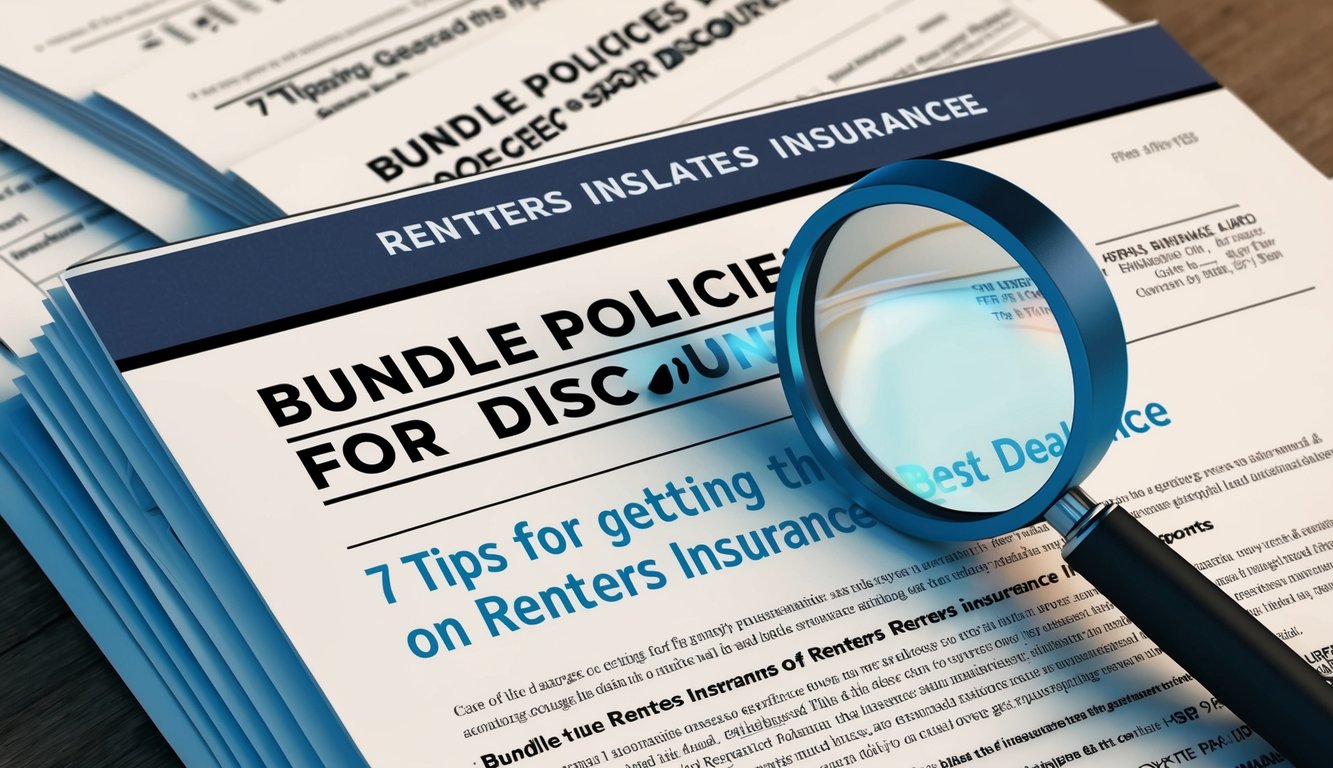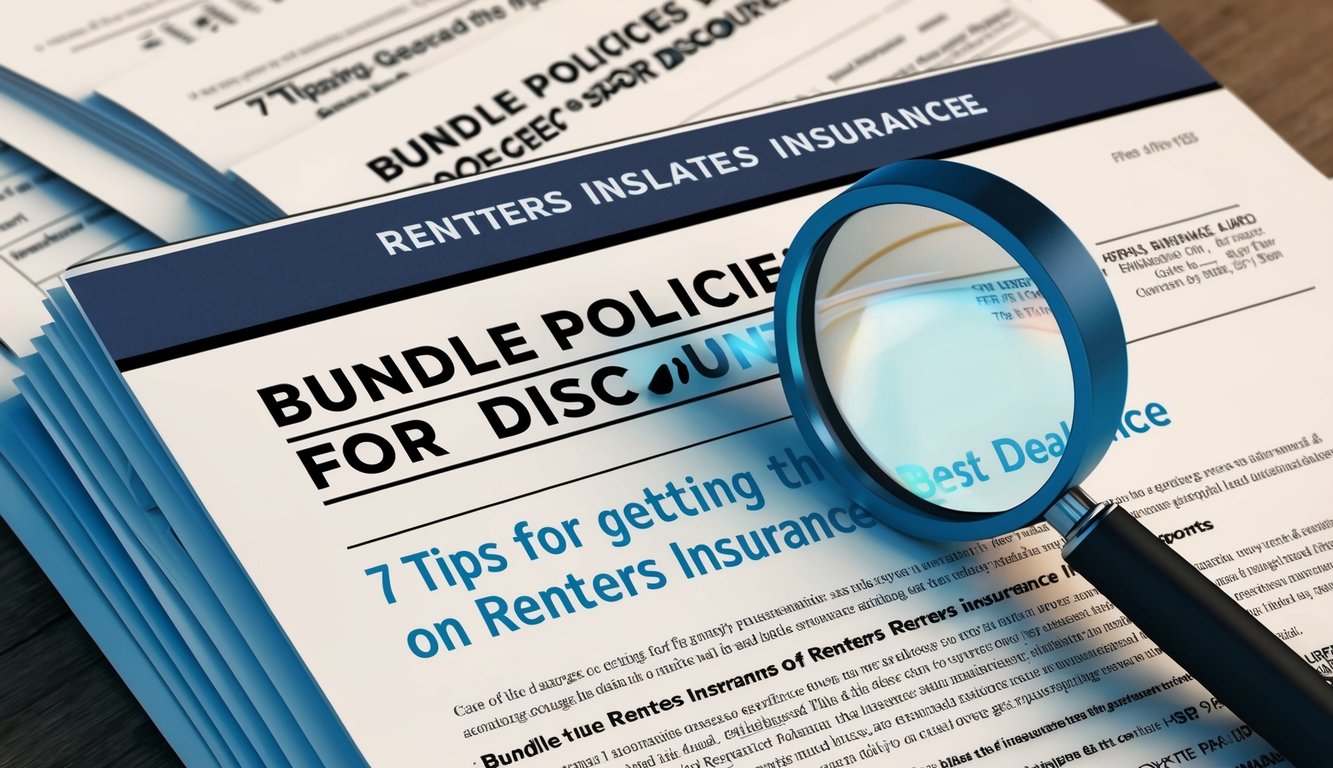Renters insurance provides crucial protection for your belongings and liability coverage while renting a home or apartment.
It’s an affordable way to safeguard your possessions from theft, fire, and other unexpected events. You can typically secure a policy for less than $20 per month, making it an excellent value for the peace of mind it offers.
Shopping for renters insurance doesn’t have to be complicated or time-consuming.
With a bit of research and smart comparison shopping, you can find a policy that meets your needs without breaking the bank.
The following tips will help you navigate the process and secure the best possible deal on your renters insurance coverage.
1) Shop Around for Quotes
Getting the best deal on renters insurance starts with comparing quotes from multiple providers.
Don’t settle for the first offer you receive.
Take the time to gather quotes from different insurance companies.
This allows you to see the range of prices and coverage options available.
Prices can vary significantly between insurers for the same level of coverage.
Some companies may offer better rates for your specific situation.
Use online comparison tools to streamline the process.
These platforms let you input your information once and receive quotes from several insurers simultaneously.
Don’t forget to check with your current auto or life insurance provider.
Many companies offer discounts for bundling multiple policies.
When comparing quotes, make sure you’re looking at similar coverage levels.
A lower price might mean less protection, so read the details carefully.
Consider factors beyond just price.
Look at the company’s reputation, customer service ratings, and claim process when making your decision.
Be prepared to provide basic information about yourself and your rental property.
This includes details like your address, the type of building, and any safety features.
2) Shop Around for Quotes (continued)

Shopping for renters insurance doesn’t have to be complicated or time-consuming.
With a bit of research and smart comparison shopping, you can find a policy that meets your needs without breaking the bank.
The following tips will help you navigate the process and secure the best possible deal on your renters insurance coverage.
2) Bundle Policies for Discounts

Bundling your renters insurance with other policies can lead to significant savings.
Many insurance companies offer discounts when you combine multiple policies under one provider.
The most common bundle is auto and renters insurance.
This combination often results in substantial discounts on both policies.
Some insurers offer up to 4.7% off when you bundle these two coverages.
To get started, obtain quotes from various insurers.
Compare the bundled rates to your current separate policy costs.
You might be surprised by the potential savings.
Don’t limit yourself to just auto insurance.
Some companies offer discounts for bundling renters insurance with life, motorcycle, or even pet insurance policies.
Before committing to a bundle, ensure the coverage meets your needs.
A lower price isn’t always the best deal if it means sacrificing necessary protection.
Remember to gather all required information before requesting quotes.
This includes your driver’s license and details about your rental property and vehicle.
3) Bundle Policies for Discounts (continued)

Bundling your renters insurance with other policies can lead to significant savings.
Many insurance companies offer discounts when you combine multiple policies under one provider.
The most common bundle is auto and renters insurance.
This combination often results in substantial discounts on both policies.
Some insurers offer up to 4.7% off when you bundle these two coverages.
To get started, obtain quotes from various insurers.
Compare the bundled rates to your current separate policy costs.
You might be surprised by the potential savings.
Don’t limit yourself to just auto insurance.
Some companies offer discounts for bundling renters insurance with life, motorcycle, or even pet insurance policies.
Before committing to a bundle, ensure the coverage meets your needs.
A lower price isn’t always the best deal if it means sacrificing necessary protection.
Remember to gather all required information before requesting quotes.
This includes your driver’s license and details about your rental property and vehicle.
4) Increase Deductibles
Raising your deductible can significantly lower your renters insurance premiums.
The deductible is the amount you pay out of pocket before your insurance coverage kicks in.
Most renters insurance policies start with a deductible of $500.
By increasing this amount, you can reduce your monthly or annual payments.
Consider raising your deductible to $1,000 or even higher if you can afford it.
This change could lead to substantial savings on your premiums over time.
Before increasing your deductible, make sure you have enough savings to cover the higher amount if you need to file a claim.
It’s important to balance potential savings with your ability to pay the deductible.
Remember that a higher deductible means you’ll pay more out of pocket for smaller claims.
Weigh this against the reduced premium costs when making your decision.
You can ask your insurance provider to calculate how much you’ll save with different deductible levels.
This information will help you choose the best option for your financial situation.
5) Ask About Discounts
When shopping for renters insurance, always inquire about available discounts.
Many insurers offer various ways to reduce your premium, potentially saving you money on your policy.
One common discount is for safety features.
Installing smoke detectors, fire extinguishers, or security systems in your rental property can lead to lower rates.
These devices reduce the risk of damage or theft, making you a more attractive customer to insurance companies.
You may also qualify for a multi-policy discount.
If you already have auto insurance, consider bundling it with your renters policy from the same provider.
This often results in savings on both policies.
Some insurers offer discounts for paying your premium in full upfront rather than in monthly installments.
While this requires a larger initial payment, it can lead to overall savings on your policy.
Don’t forget to ask about loyalty discounts if you’ve been with the same insurer for a while.
Some companies reward long-term customers with reduced rates.
Claim-free discounts are another possibility.
If you haven’t filed a claim in recent years, you might be eligible for lower premiums.
Remember, discounts vary by insurer and location.
Always ask for a complete list of available discounts when getting quotes.
This ensures you’re taking advantage of all possible savings opportunities.
6) Improve Your Credit Score
Your credit score can significantly impact your renters insurance rates.
In most states, insurers use credit-based insurance scores to determine premiums. Poor credit could raise your renters insurance rates by an average of 66%.
To potentially lower your insurance costs, focus on improving your credit score.
Start by making all your payments on time, as payment history is a crucial factor in credit scoring.
Pay down your credit card balances to reduce your credit utilization ratio.
Aim to keep your balances below 30% of your credit limits.
Avoid applying for new credit unnecessarily, as each application can result in a hard inquiry on your credit report.
These inquiries can temporarily lower your score.
Check your credit report regularly for errors.
If you find any inaccuracies, dispute them with the credit bureaus.
Correcting mistakes can lead to a quick boost in your score.
Consider becoming an authorized user on a responsible person’s credit card account.
Their positive payment history could help improve your credit score.
As your credit score improves, don’t forget to shop around for new insurance quotes.
You may qualify for better rates with your enhanced credit profile.
7) Consider Actual Cash Value vs. Replacement Cost

When shopping for renters insurance, you’ll encounter two main options for personal property coverage: actual cash value (ACV) and replacement cost value (RCV).
Actual cash value reimburses you for the current value of your belongings, taking into account depreciation.
This means you’ll receive less money for older items.
Replacement cost value, on the other hand, pays the full amount needed to replace your items with new ones of similar quality.
This option typically provides better coverage but comes at a higher premium.
To decide which option is best for you, consider the value and age of your possessions.
If you have many expensive or newer items, RCV might be worth the extra cost.
Keep in mind that some policies offer extended replacement cost coverage, which can pay an additional 20% to 25% above the policy limit.
This extra protection can be valuable if replacement costs suddenly increase.
When comparing quotes, ask insurers about both ACV and RCV options.
Calculate the difference in premiums and weigh it against the potential benefits of each coverage type.
Remember that your choice affects how much you’ll receive in the event of a claim.
Carefully assess your needs and budget to make the best decision for your situation.
8) Review Policy Annually

Set a reminder to review your renters insurance policy each year.
Your needs may change over time, affecting the coverage you require.
Take stock of your belongings annually.
You might have acquired new valuable items or gotten rid of others.
Adjust your coverage accordingly to ensure you’re not over or under-insured.
Check if your insurance company offers any new discounts.
You may qualify for additional savings based on changes in your lifestyle or living situation.
Compare your current policy with offers from other providers. Getting quotes from multiple insurers can help you find better rates or coverage options.
Consider adjusting your deductible.
If you’ve built up savings, you might be comfortable with a higher deductible, which can lower your premium.
Review your liability coverage.
As your assets grow, you may need to increase this protection to safeguard your financial future.
Ask your insurer about bundling options.
Combining renters insurance with other policies, like auto insurance, often leads to discounts.
Evaluate any life changes that might affect your policy.
Moving to a new area or getting married could impact your insurance needs and costs.
Understanding Renters Insurance

Renters insurance protects your personal belongings and provides liability coverage in your rented home.
It offers financial security against unexpected events like theft, fire, or accidents.
What Is Renters Insurance?
Renters insurance is a policy that safeguards tenants’ possessions and offers liability protection.
It covers your personal property in case of damage or loss due to covered perils.
These perils typically include fire, theft, vandalism, and certain natural disasters.
The policy also provides liability coverage if someone is injured while visiting your rental.
This can help pay for medical expenses and legal fees if you’re sued.
Unlike homeowners insurance, renters insurance doesn’t cover the building structure.
That’s your landlord’s responsibility.
Your policy focuses on protecting your personal items and financial interests as a tenant.
Types of Coverage
Renters insurance generally offers three main types of coverage:
-
Personal Property: This covers your belongings, such as furniture, clothing, and electronics. If these items are damaged or stolen, your insurance can help replace them.
-
Liability: This protects you if someone is injured in your rental or you accidentally damage someone else’s property. It can cover medical bills and legal expenses.
-
Additional Living Expenses: If your rental becomes uninhabitable due to a covered event, this coverage helps pay for temporary housing and extra living costs.
Some policies may offer optional coverages like valuable items protection for high-value possessions or identity theft coverage.
You can customize your policy to fit your specific needs and budget.
Factors Affecting Renters Insurance Rates

Several key elements influence the cost of your renters insurance policy.
Understanding these factors can help you make informed decisions and potentially lower your premiums.
Location
Your address plays a significant role in determining your renters insurance rates.
Areas with higher crime rates or frequent natural disasters typically lead to higher premiums.
Urban locations often have higher rates than rural areas due to increased risks of theft and property damage.
Insurers also consider the safety features of your neighborhood.
Living near a fire station or in a gated community may result in lower rates.
Meanwhile, flood-prone regions or areas susceptible to earthquakes can increase your premiums.
The age and condition of your building matter too.
Older structures or those with outdated electrical systems may be seen as higher risks, potentially raising your rates.
Coverage Limits
The amount of coverage you choose directly impacts your premiums.
Higher coverage limits for personal property and liability protection will increase your rates.
Consider the value of your belongings when setting coverage limits.
Create an inventory of your possessions to determine an appropriate amount.
Don’t underestimate replacement costs.
Some high-value items like jewelry or electronics may require additional coverage.
This extra protection, known as scheduled personal property coverage, will increase your premiums but provide better protection for valuable items.
Deductibles
Your deductible is the amount you pay out of pocket before your insurance kicks in.
Choosing a higher deductible can lower your monthly premiums.
Common deductible options range from $250 to $1000.
When selecting a deductible, consider your financial situation.
Can you afford to pay a higher amount if you need to file a claim?
Balance the potential savings on premiums with your ability to cover the deductible.
Remember that a lower deductible means higher premiums, while a higher deductible results in lower monthly costs but more out-of-pocket expenses if you file a claim.
Security Features
Installing security devices in your rental can lead to discounts on your insurance.
Common features that may qualify for discounts include:
- Smoke detectors and fire alarms
- Carbon monoxide detectors
- Deadbolt locks
- Security systems
- Sprinkler systems
These features reduce the risk of theft, fire, and other damages, making you a lower risk to insure.
Ask your insurance provider about specific discounts for security features.
Some insurers offer extra discounts for smart home devices.
These devices can detect water leaks or control temperature.
These technologies can prevent costly damage and may result in lower premiums.






